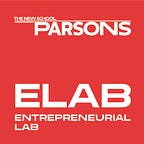Think Your Design Ideas Are Possible Business Opportunities?
An Introduction to Entrepreneurship for Designers
Author: Rhea Alexander
Many young entrepreneurs come to Parsons and then apply to the Parsons Entrepreneurs Lab because of Parson’s reputation as a top design school. They seek to learn the innovative methods of design that businesses like Invision, Unfold (an alumnus of Elab), and AirBnB is successfully using to stay ahead of their competition and create value for their customers. But this article is for those of you who are already designers and might have an idea that you want to turn into a business. You think you want to become an entrepreneur, you want to found a start-up, but you don’t know where to begin or what that even means. Keep reading.
Designers can use a combination of design strategies and traditional business strategies to solve challenges, create value, and launch a profitable and impact-driven business. Hartmut Esslinger, the founder of frog design, is believed to be one of the fathers of design-led strategies, merging design and business strategy back in the 1960s. His claim to fame was working early on with Apple and he is the author of A Fine Line: How Design Strategies Are Shaping the Future of Business.
The traditional business strategy used to take place in a stable or predictable environment by exploiting competencies and resources. However, today’s world is anything but stable and we’re running out of natural resources due to human and business exploitation. That is why strategic design has become popular because it takes these shifts and changes into account looking into the past, grounded in the present, and facing the future.
What is an entrepreneur?
Entrepreneurs are creators of new businesses, aka start-ups, and are often called a founder. Entrepreneurs play a key role in the economy, using their ingenuity, skills, and initiative to anticipate needs and bring new goods and services to market. There is risk, intuition, and prediction involved. There are many traits attributed to entrepreneurs such as tenaciousness, persistence, and persuasiveness, but creating value in the world and bringing about something from nothing is a highly creative act, which is why designers are well-positioned to take on the challenge.
What is a business model?
A business model is an economic model you are using to earn income. There are many good resources to help you figure out your business model such as the Business Model Navigator by Oliver Gassmann. You’re going to want to sketch out your business idea to figure out where you create value and can charge for your products or services. If you’re a scalable tech company there are several ways you can earn income. The same goes for if you’re building a non-profit. If you’re interested in a more traditional service-based business or say an agency, this is a fee-based model and there are a few variations of those as well. Building a collective is yet another model. We can get into all this more in-depth in another post. (Leave us a comment if you’d like us to go down this rabbit hole with you.)
A business will need to be incorporated as well. For this, you will most likely need (want) a lawyer to advise you. There can be large tax implications and consequences down the line if you don’t consider all your options and discuss them fully with your advisors. (If you’d like us to go into more detail again leave us a note and we’ll address it in another post)
What are incubators and accelerators and what do they help with?
These are programs that help you launch your business depending on what stage you are in. Incubators tend to be for those of you who have an idea, but not yet a business model or company, whereas accelerators are for existing businesses that are in the early stages but want to accelerate, or kick-start, the growth of their business. For a fee or percent of your business or both, both types of programs help you figure out your business model, work out your valuation, teach you how to run your business, and pitch to investors.
Most business incubators and accelerators are sector-specific and seek businesses that are scalable and investable. This means that they will grow fast and have the potential to make exponential money whereby investors, who become shareholders, might be able to cash out their stocks and make money on their initial investment. Many Incubators/accelerators are well connected to funders such as venture capital or angel investors interested in investing in those sectors. At Parsons Elab’s incubator program, we are business model and sector agnostic and currently do not take any fees or a percent. If you’re lucky to receive a fellowship, you earn a grant, support, and mentorship for a year.
Most importantly, why should you turn your design idea into a business?
There might be many good reasons why you should think about using your design skills to start a business. Maybe you’re working on a challenge that you’re passionate about and think you’ve designed a product or a service that could make an impact on the problem. Maybe you just want to be your own boss and choose the types of projects that you work on. Whatever the reason, follow your gut as the most successful entrepreneurs do. If your gut is telling you to go for it, keep following us for more content and tools to help you get going.
